Search Results
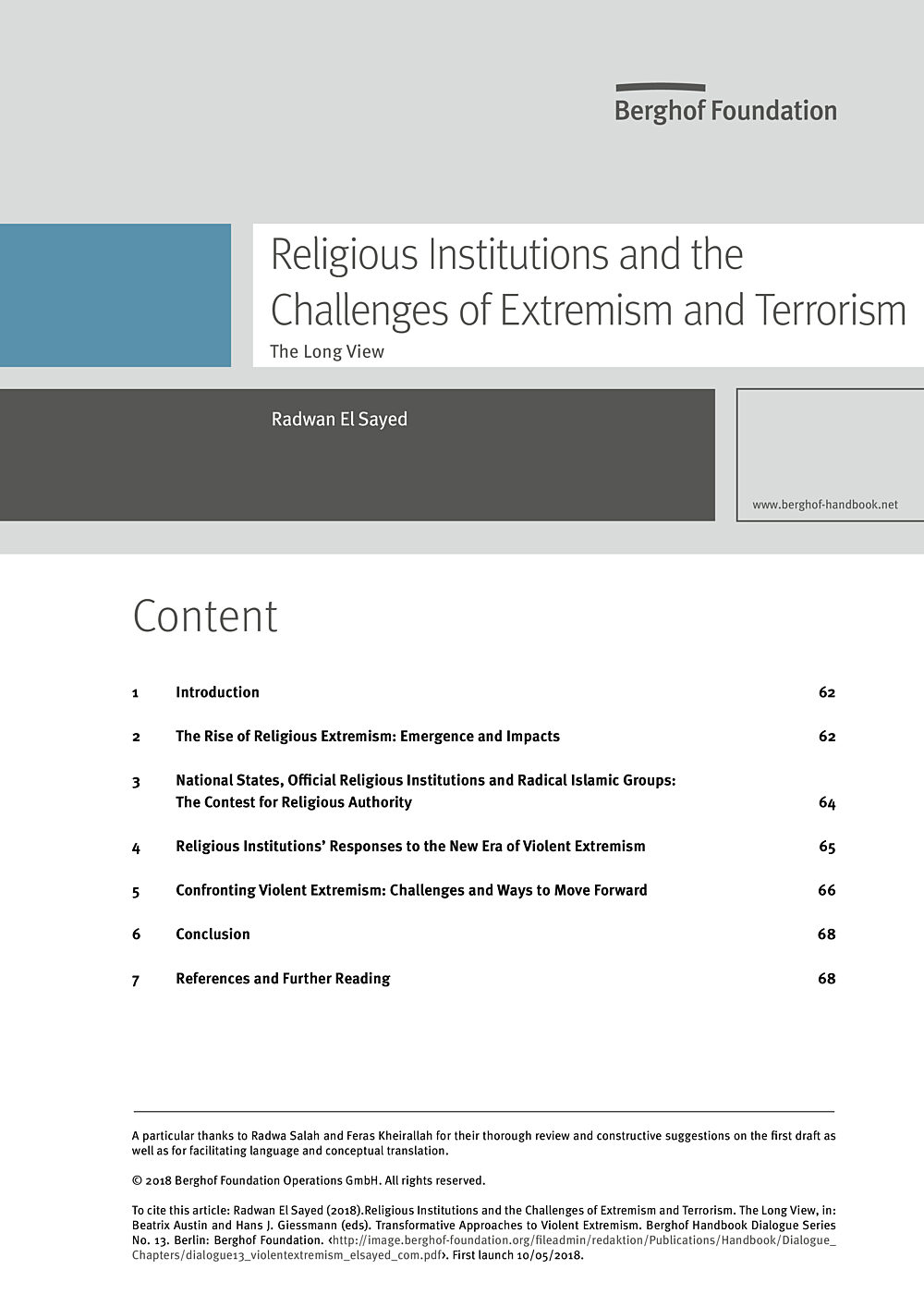
Religious Institutions and the Challenges of Extremism and Terrorism: A Long ViewBerghof Handbook Dialogue Series No. 13 - comment
This article will trace how religious institutions have dealt with the phenomena of radicalisation and violent extremism since the early 1970s and the role these institutions have recently played in C/PVE programmes. My essay intersects with the discussion in the lead article on the lack of clear long-term strategies and tool kits that assist religious institutions to participate effectively in C/PVE programmes without threatening their credibility with their constituencies. (1) This includes the necessity of empowering the religious institutions to develop tools and frameworks that use the language of faith and reflect their spiritual and religious traditions. (2) Based on the impact of a certain securitisation of C/PVE approaches in the region on the religious institutions and their constituencies, I am convinced that it is important for religious institutions to rebuild the trust with their constituencies based on the principle of inclusivity and enhanced outreach efforts.
- Year 2018
- Author(s) Radwan Al-Sayed
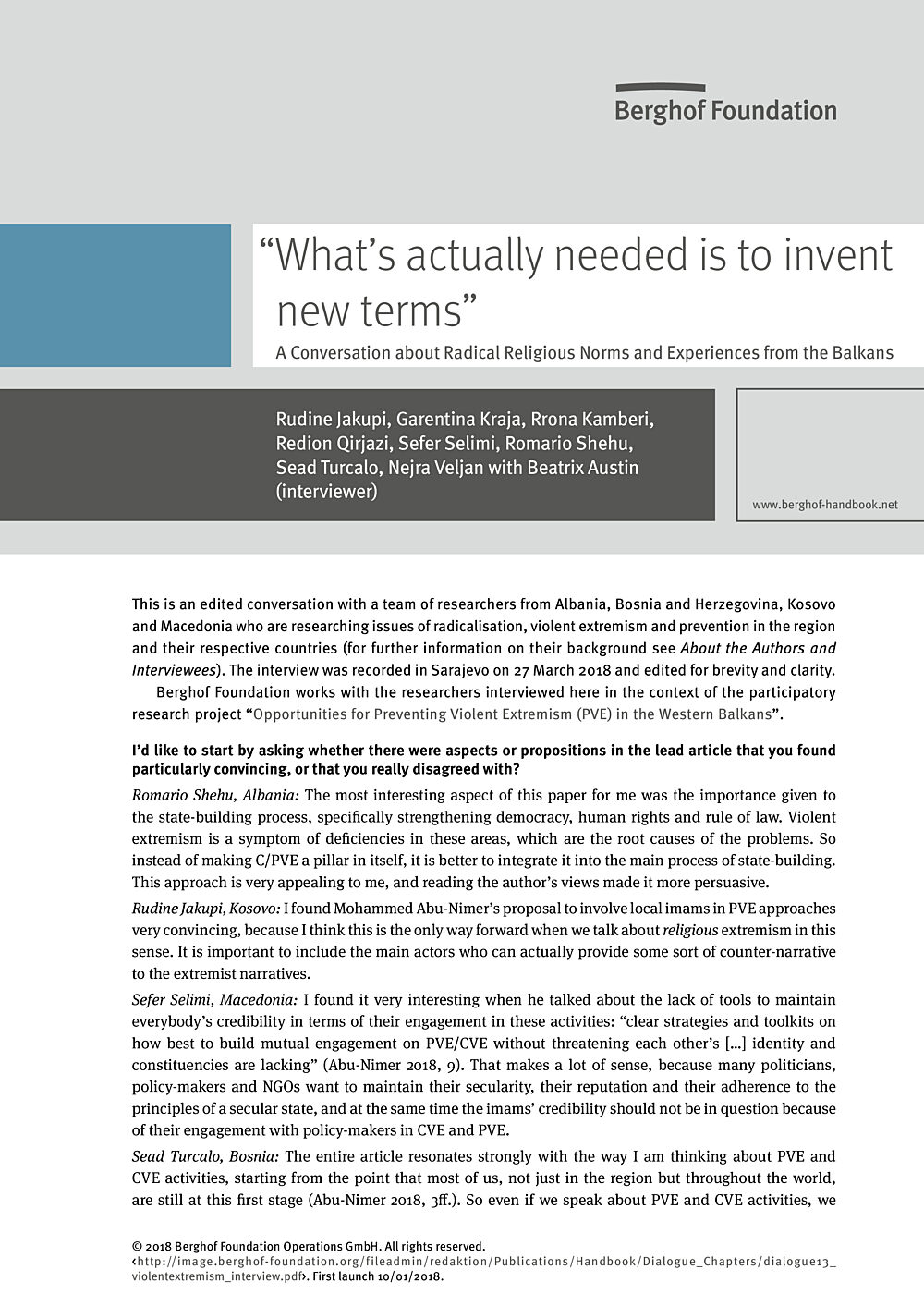
'What is actually needed is to invent new terms': An interview on Radical Religious Norms and Experiences from the BalkansBerghof Handbook Dialogue Series No. 13 - comment
This interview with Rudine Jakupi, Garentina Kraja, Rrona Kamberi, Redion Qirjazi, Sefer Selimi, Romario Shehu, Sead Turcalo and Nejra Veljan is an edited conversation with a team of researchers from Albania, Bosnia and Herzegovina, Kosovo and Macedonia who are researching issues of radicalisation, violent extremism and prevention in the region and their respective countries. The interview was recorded in Sarajevo on 27 March 2018 and edited for brevity and clarity. Berghof Foundation works with the researchers interviewed here in the context of the participatory research project "Opportunities for Preventing Violent Extremism (PVE) in the Western Balkans".
- Year 2018
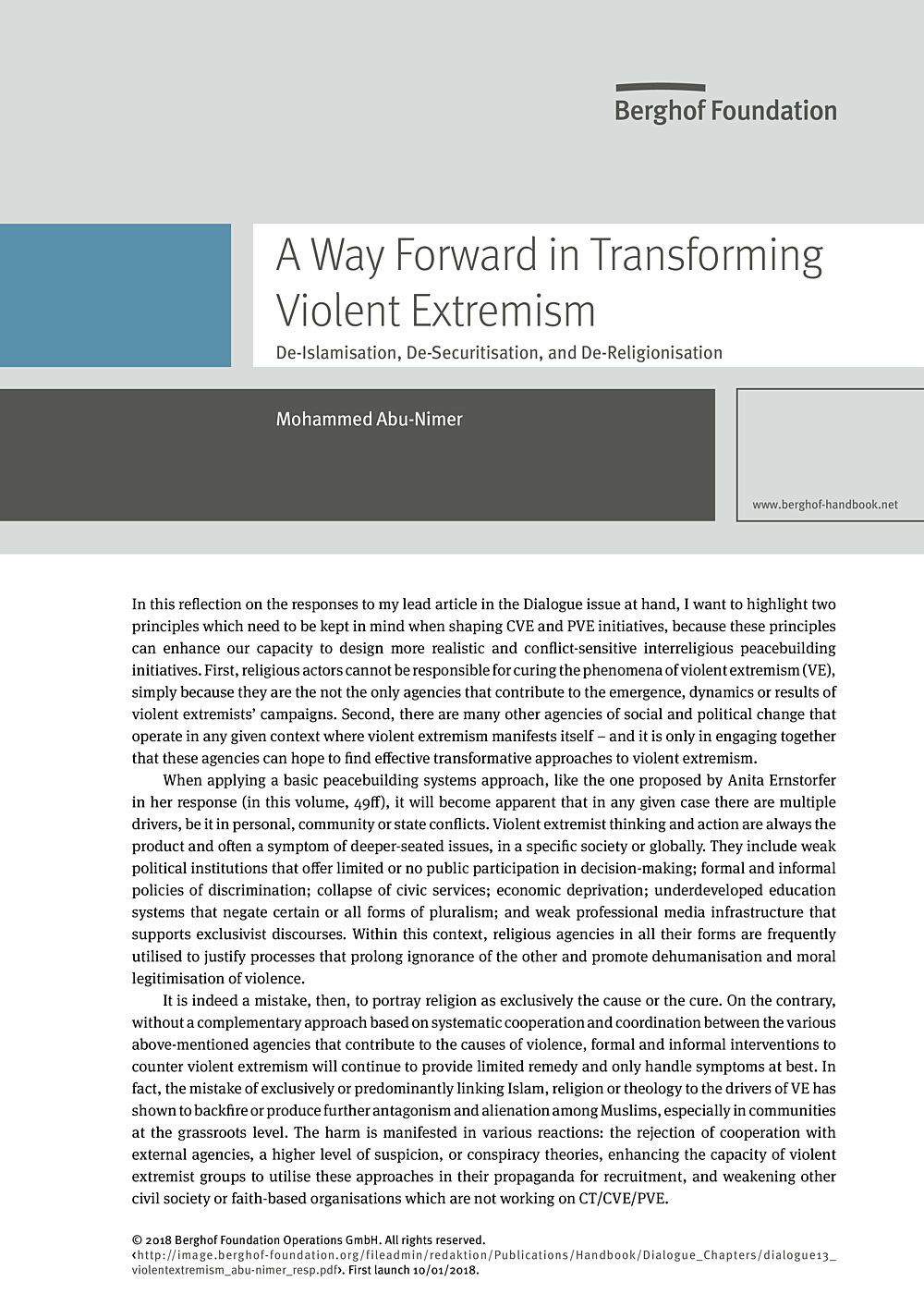
A Way Forward in Transforming Violent Extremism: De-Islamisation, De-Securitisation, and De-ReligionisationHandbook Dialogue Series No. 13 - final reflection
In this reflection on the responses to my lead article in the Dialogue issue at hand, I want to highlight two principles which need to be kept in mind when shaping CVE and PVE initiatives, because these principles can enhance our capacity to design more realistic and conflict-sensitive interreligious peacebuilding initiatives. First, religious actors cannot be responsible for curing the phenomena of violent extremism (VE), simply because they are the not the only agencies that contribute to the emergence, dynamics or results of violent extremists’ campaigns. Second, there are many other agencies of social and political change that operate in any given context where violent extremism manifests itself – and it is only in engaging together that these agencies can hope to find effective transformative approaches to violent extremism.
- Year 2018
- Author(s) Mohammed Abu-Nimer
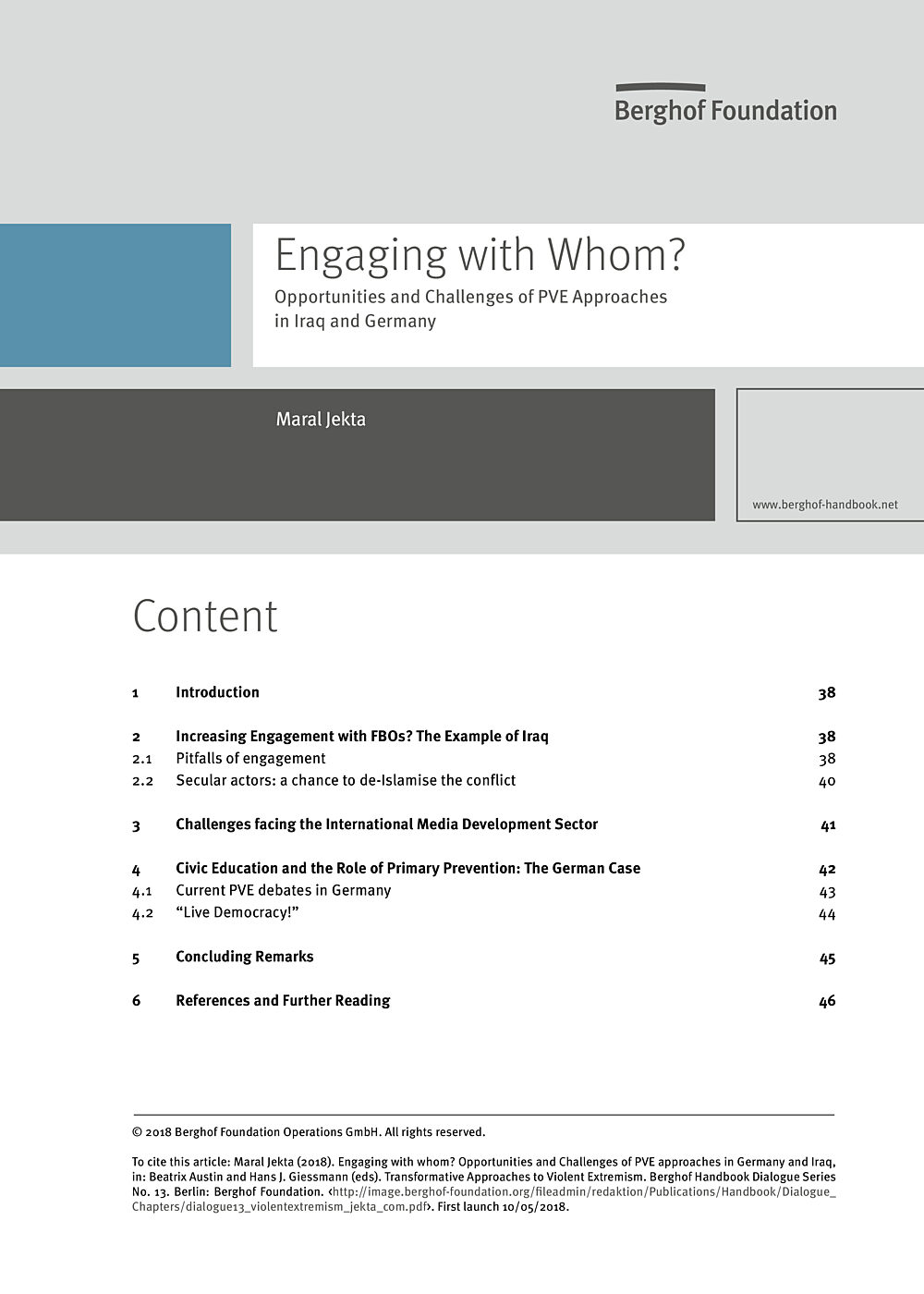
Engaging with whom? Opportunities and Challenges of PVE approaches in Germany and IraqBerghof Handbook Dialogue No. 13 - comment
This comment on the lead article to our Handbook Dialogue on Transformative Approaches to Violent Extremism discusses Abu-Nimer’s suggestion to engage more seriously with religious agencies and actors, using Iraq as an example.
It examines how religion and its identity components are being integrated in project structures of international NGOs (INGOs) in Iraq and the limitations of this approach. It also presents the negative impact of CVE/PVE approaches on practitioners in the field of international media development. Finally, the article discusses the German Government’s ‘Live Democracy!’ to support the call for a holistic ‘idealism’ approach in PVE.
- Year 2018
- Author(s) Maral Jekta
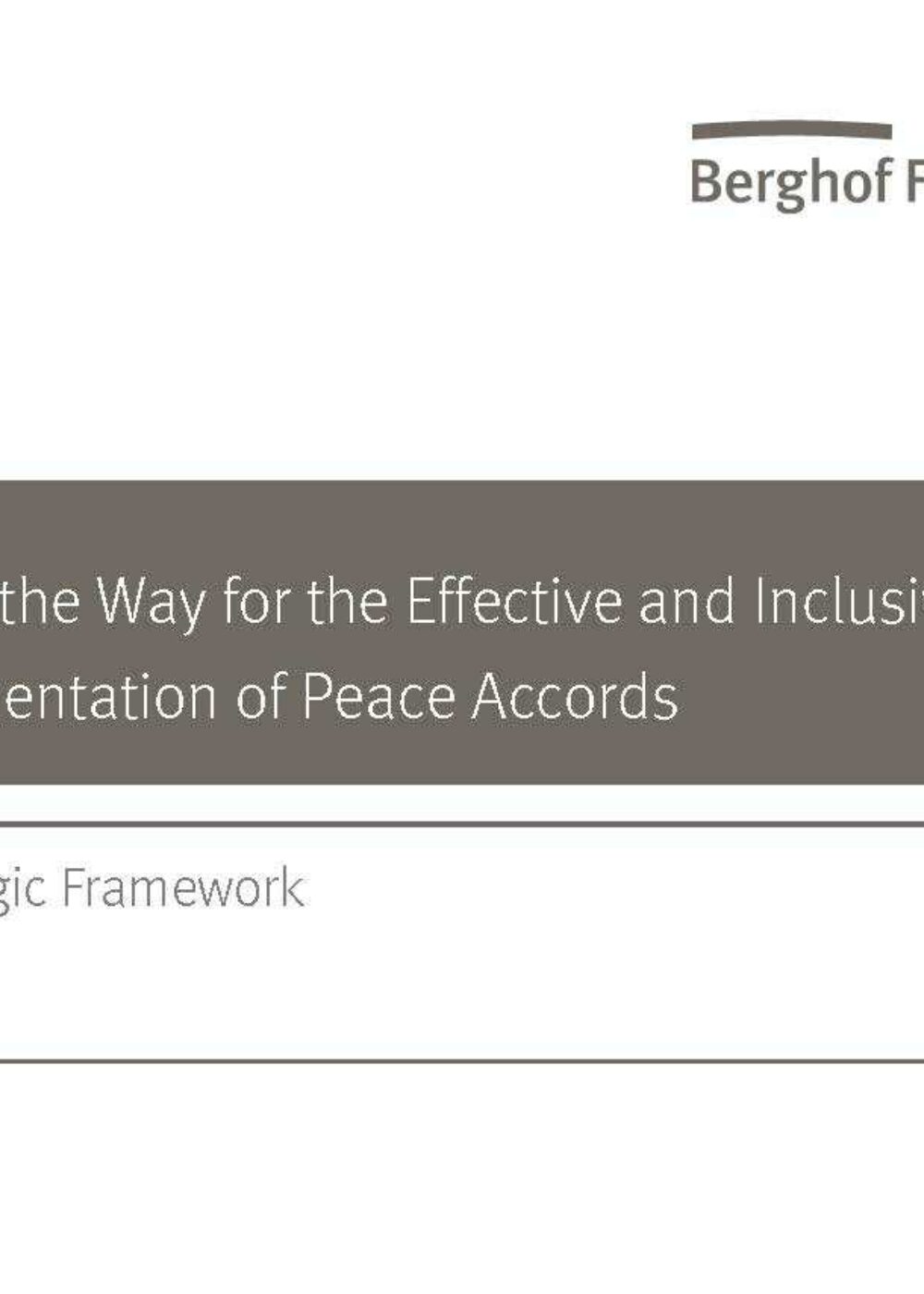
Paving the Way for the Effective and Inclusive Implementation of Peace AccordsA Strategic Framework
This strategic framework was developed during the 8th Meeting on Negotiations entitled The Implementation of Accords and the Role of International Third Parties held in October 2016, in Berlin. It provides an overview of some of the most frequent challenges Resistance and Liberation Movements (RLMs) are facing with regard to the implementation phase of peace agreements and ways to overcome them. This overview aims at giving our readers the possibility to reflect and improve their strategies in the nexus of negotiation and implementation.
- Year 2017
- Author(s) Nico Schernbeck, Luxshi Vimalarajah
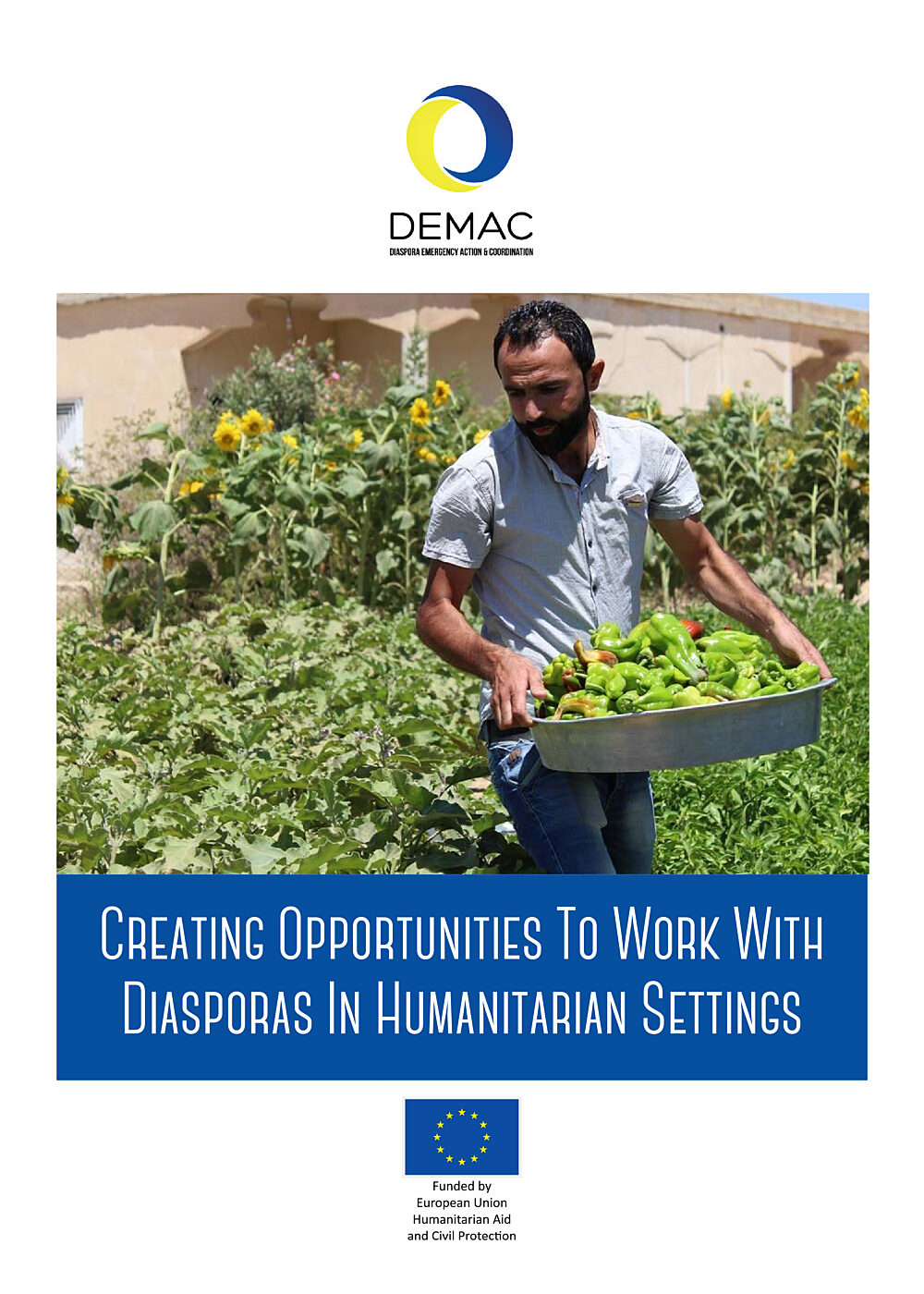
Creating Opportunities To Work With Diasporas In Humanitarian Settings
Diaspora organisations (DOs) are newly recognised actors in the humanitarian space. DOs respond to crises such as those in Syria, Somalia, and Nigeria, which have shown the limitations of the traditional humanitarian sector. Their contributions to emergency response are under-studied and, as our research shows, often misunderstood due to a gap in knowledge about their work.
- Year 2018
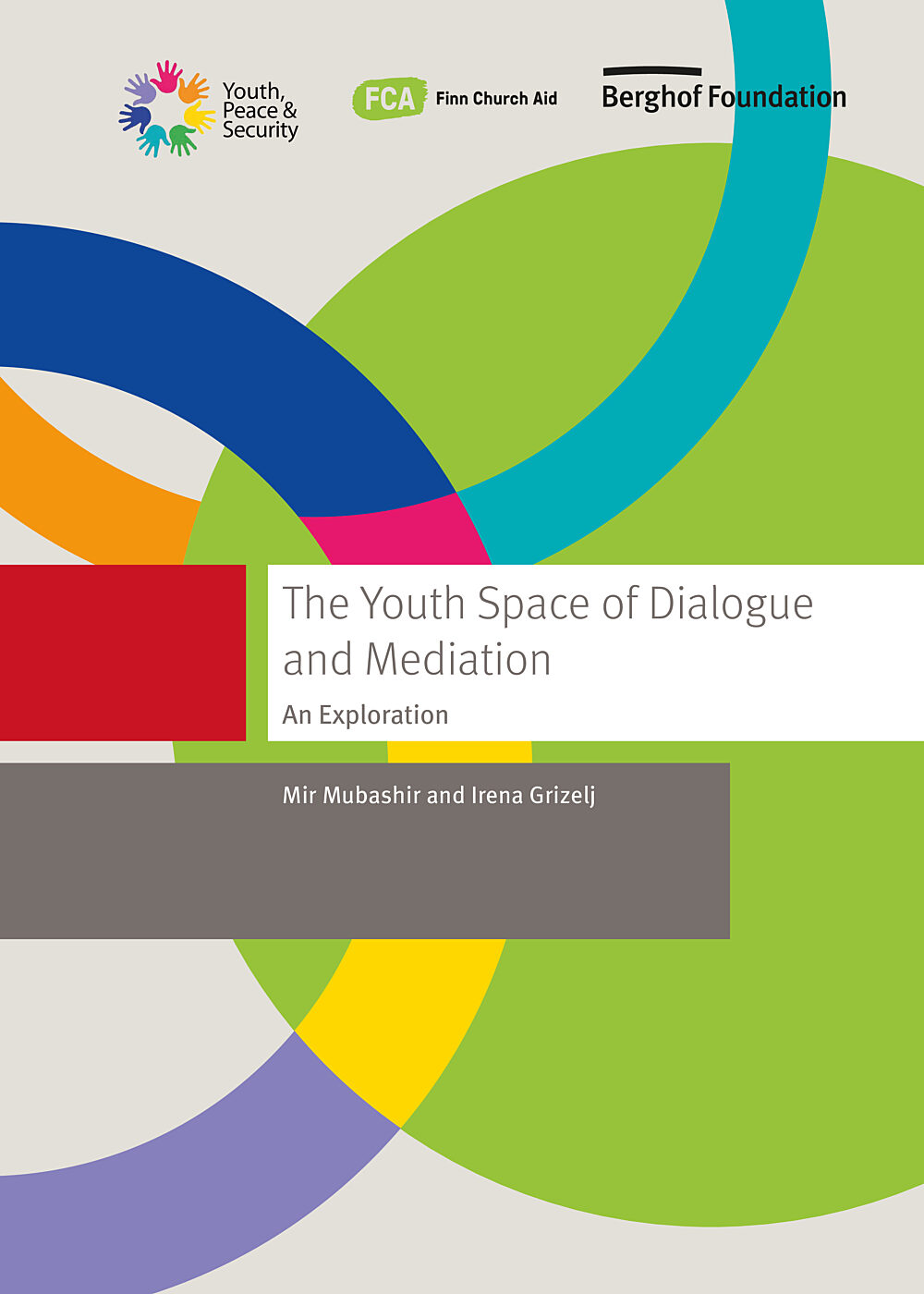
The Youth Space of Dialogue and MediationAn Exploration
This exploration decidedly disengages from the prevalent discourses on youth, which are already quite well-covered in literature: ‘they are both troublemakers and peacemakers’ or ‘they are a special and potent category of peace agents, and therefore need to be empowered’. Rather, the focus of this exploration is on existing stories of dialogic and mediative efforts in the youth space, in an attempt to bring to light some insights usually left in the dark, and to stimulate a discourse hitherto absent. This is deemed particularly timely, given the inception of a myriad of initiatives since the adoption of Resolution 2250.
- Year 2018
- Author(s) Mir Mubashir, Irena Grizelj
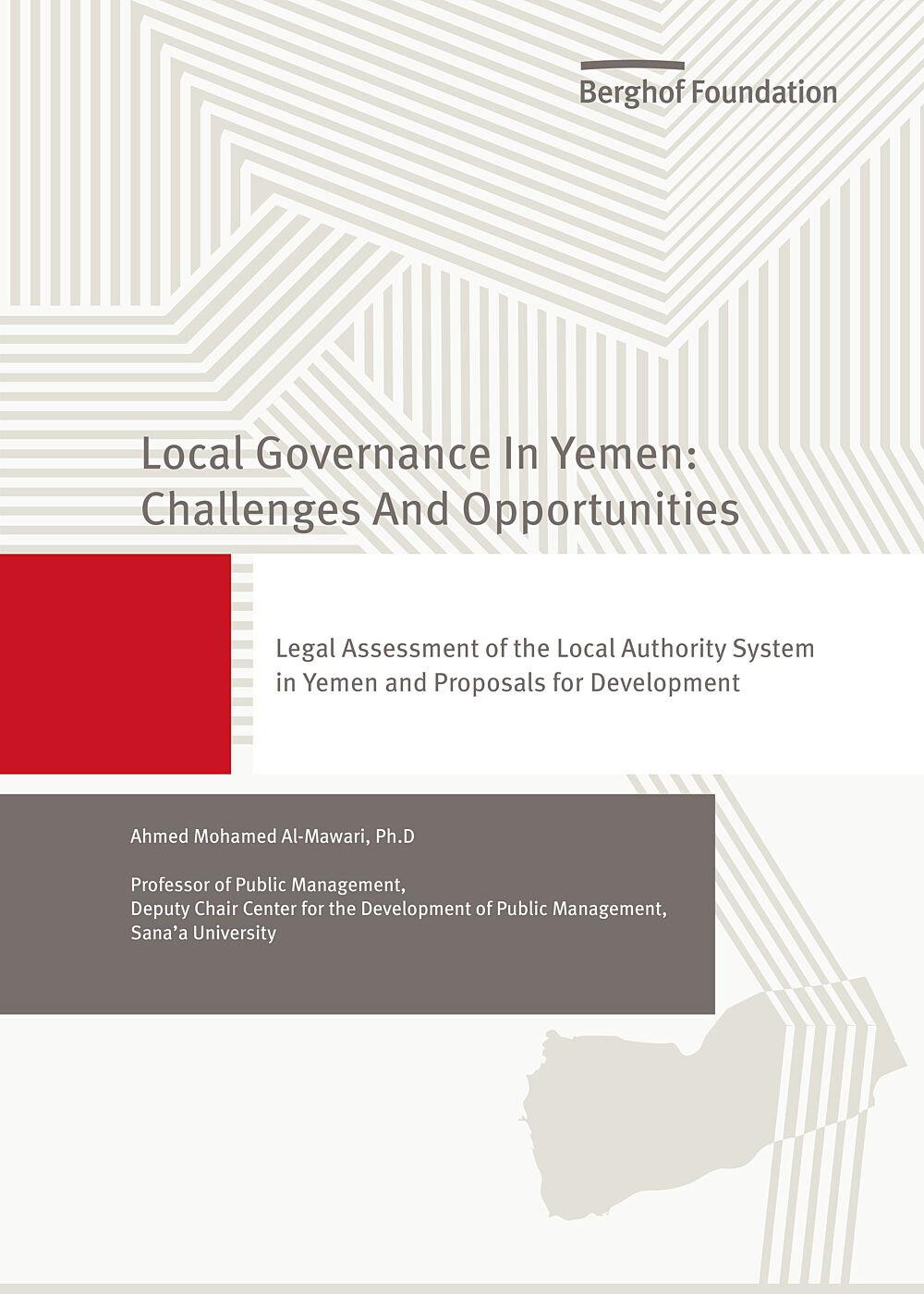
Legal Assessment of the Local Authority System in Yemen and Proposals for Development
The aim of this paper is to describe the reality of local authority legislation in Yemen, underline its strengths and weaknesses, identify the main obstacles to its implementation, and present suggestions for improving it. To attain these objectives, an integrated approach was followed based on the review and analysis of existing literature and official documents, as well as one-on-one interviews with a number of public administration leaders at central and local levels.
- Year 2018
- Author(s) Ahmed Mohamed Al-Mawari
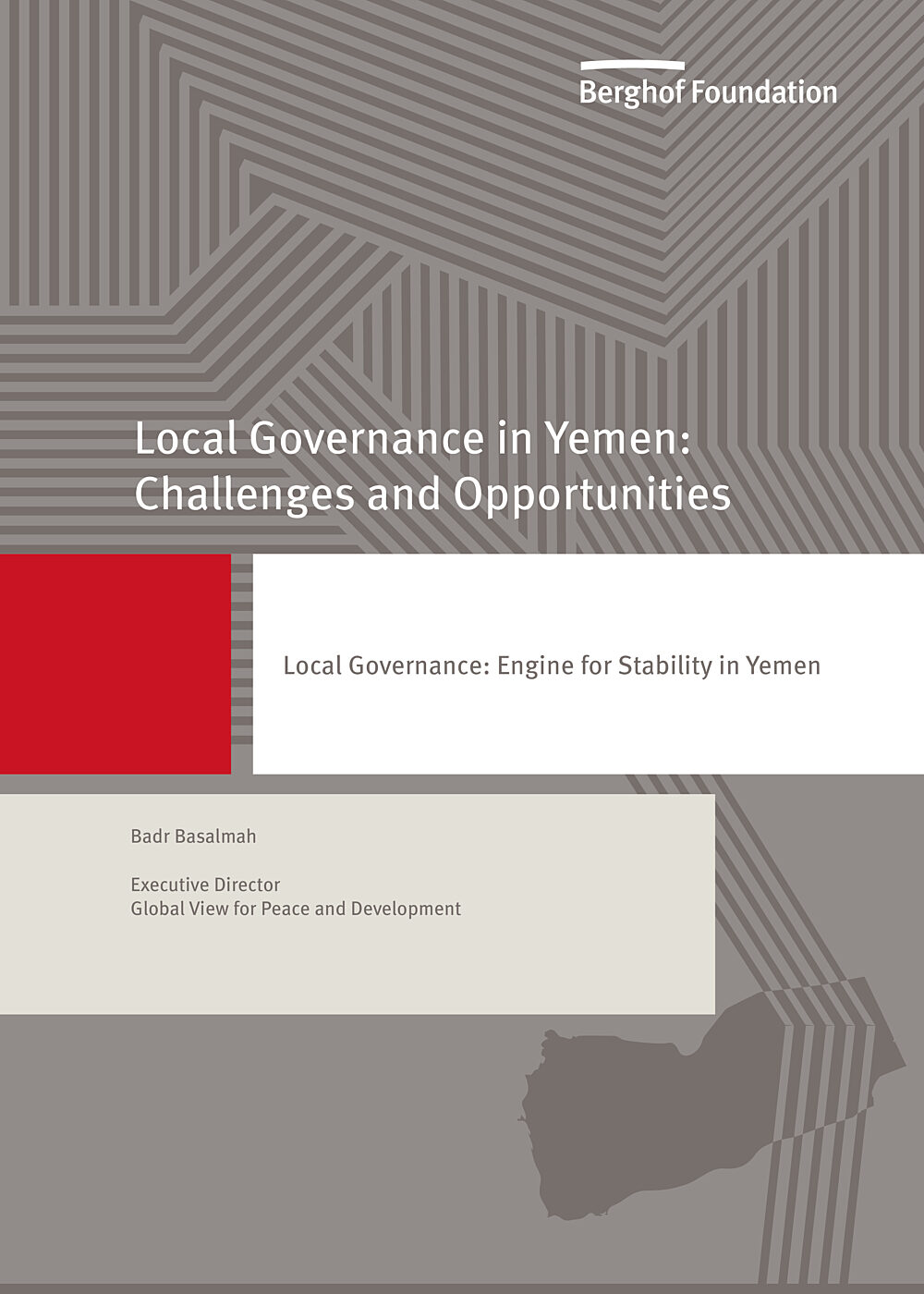
Local Governance: Engine for Stability in Yemen
This paper on the local governance experiment in Yemen seeks to review its past developmental stages and current reality. It includes governorates still under the war’s impact, as well as and those no longer affected by war, but still facing major challenges to reinforcing stability.
- Year 2018
- Author(s) Badr Basalmah
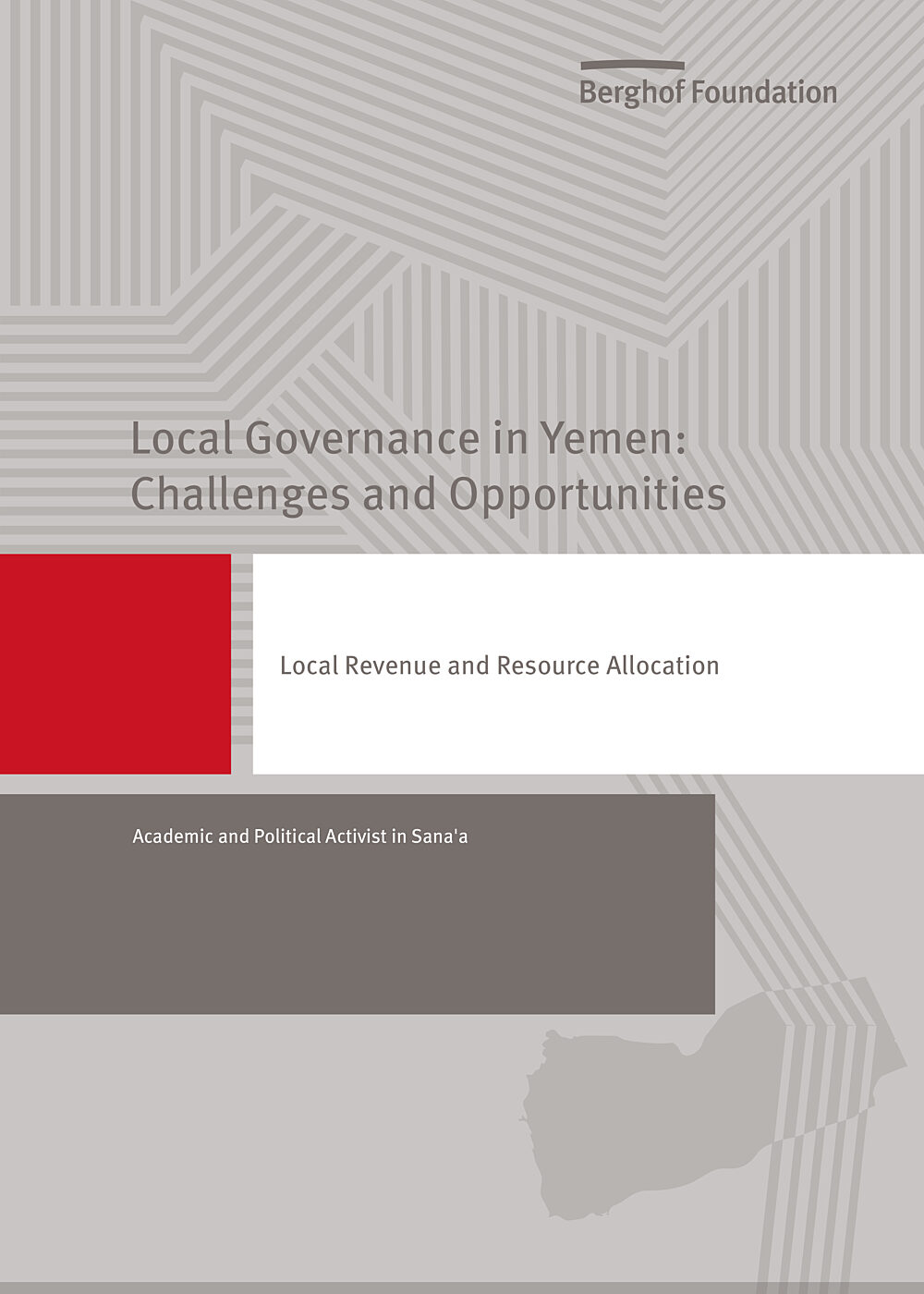
Local Revenue and Resource Allocation in Yemen
This paper, by an academic and political activist in Sana'a, will shed light on the resources available to local authorities in the Republic of Yemen, highlight the constraints on revenue collection, and propose how to address them and develop Yemeni local authority revenue streams.
This paper relies on a number of references – listed at the bottom – as well as various meetings with academics, researchers and specialists to enrich the ideas it discusses.
- Year 2018
- Author(s) Anonymous